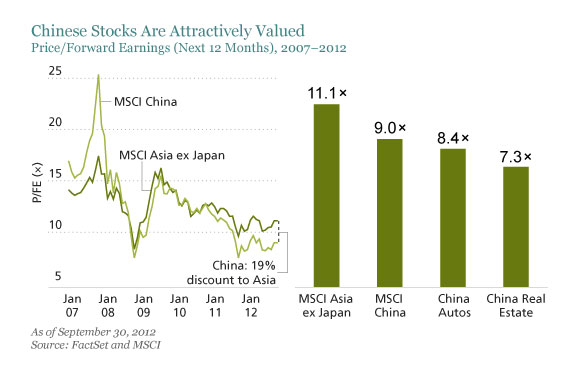Slowing economic growth, uncertainty about government policy and disappointing returns have made equity investors wary of China. In other words, it’s a perfect time to hunt for investment opportunities.
China’s lackluster economy continues to spook investors. Real gross domestic product (GDP) slowed from 7.6% in the second quarter to 7.4% in the third. But the sequential trend has probably bottomed and growth is now running at an annualized rate of about 7.5%–8%. And you can’t ignore some key underlying indicators of economic activity. For example, cement production and exports both rose by a year-on-year rate of about 10% in September after collapsing earlier in the year. These are veiled signs of strength from the world’s second-largest economy.
Skeptics argue that the central government isn’t doing enough to foster growth. It’s true that there’s little appetite for policies that might stoke inflation or saddle banks with bad debts as in 2008, especially with a leadership transition around the corner. But smaller stimulus moves have been effective, including cuts to interest rates and the reserve requirement ratio for banks, as well as accelerated subsidy programs. These actions should go a long way toward supporting a moderate pace of economic growth.
What about the stock market? The MSCI China index that represents Hong Kong-listed shares investable by foreigners rose by just 9% this year through September in US dollar terms, trailing the 16% gain of the MSCI Asia ex Japan Index. Domestic shares have done even worse, with the MSCI China A Index approximately flat this year.
This underperformance has a flip side. China has gone from being one of the most expensive markets in Asia five years ago to one of the cheapest (Display). Some industries—such as real estate and autos—offer exceptionally good value.

Given the precarious economic situation, research is crucial to identify opportunities and to avoid traps. For example, we scrutinized fears of a Chinese property bubble by analyzing real estate conditions in 70 cities. We found that house prices and home sales were more resilient than widely perceived. A government push for more affordable housing doesn’t imply a collapse in prices because, when wages are rising by 10%–15% a year, houses become more affordable even when prices stay stable.
While some parts of the Chinese consumer sectors are expensive, keep your eyes on the auto industry. Valuations of automakers have declined amid volatile sales, yet there is plenty of potential in the coming years as the middle class grows and urbanization increases. What’s more, many Chinese auto companies are quite profitable—in contrast to their Western peers.
I’m not an outright bull on China, but I think the bears who predict a catastrophe are a bit shortsighted. The evidence we see supports a stable outlook and a modest economic recovery—which underscores the potential for attractively valued stocks in specific areas. Against this backdrop, shorting China has become a classic “crowded trade”; like all crowded trades, it might seem like the right move for a while, but it can be a dangerous place to be—especially when the facts change.
MSCI makes no express or implied warranties or representations and shall have no liability whatsoever with respect to any MSCI data contained herein. The MSCI data may not be further redistributed or used as a basis for other indices or any securities or financial products. This report is not approved, reviewed or produced by MSCI.
The views expressed herein do not constitute research, investment advice or trade recommendations and do not necessarily represent the views of all AllianceBernstein portfolio-management teams.